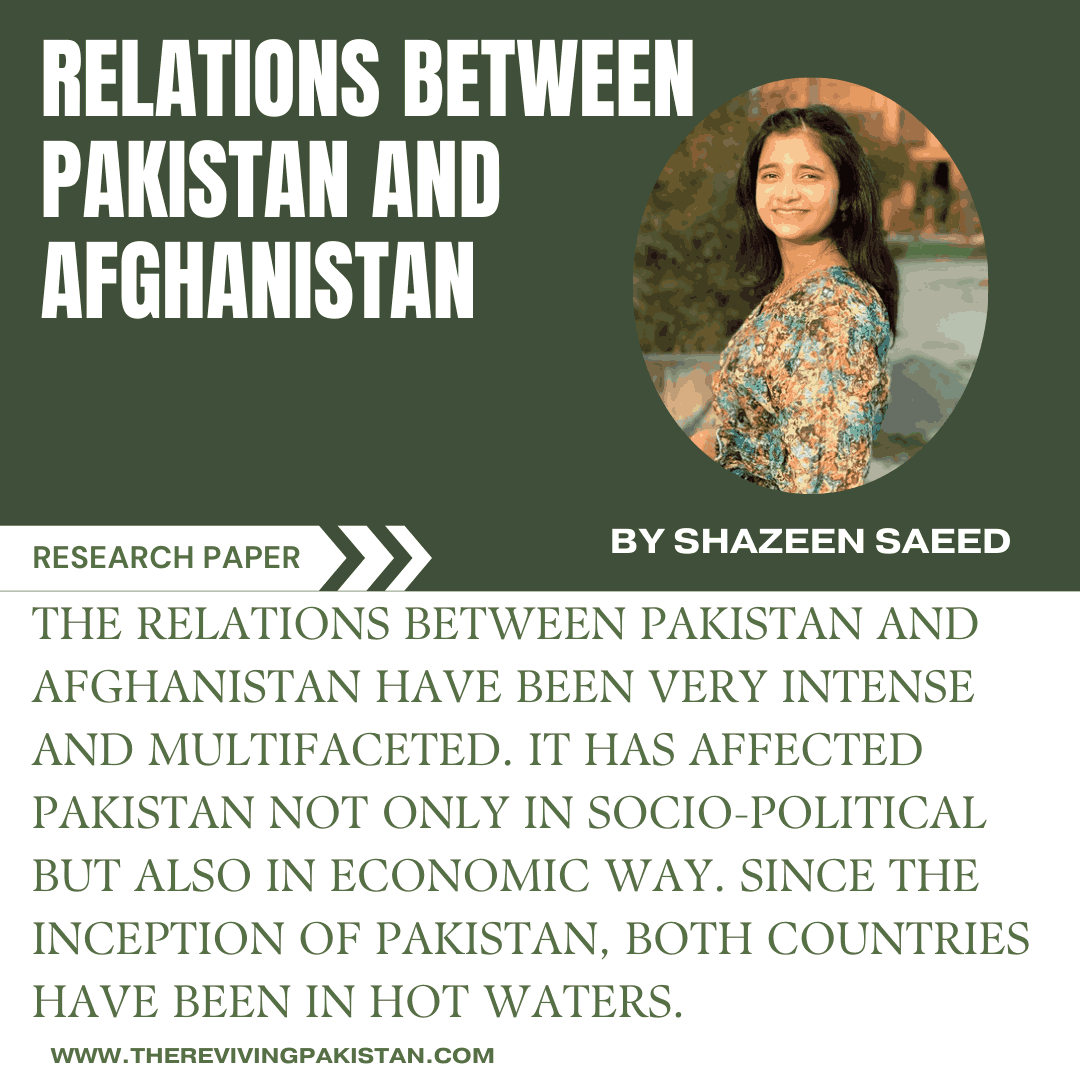Table of Contents
About the Author(s)

Shazeen Saeed
Author is a women rights activist and climate advocate. She is a student of Beaconhouse National University(BNU).
Introduction:
The relations between Pakistan and Afghanistan have been very intense and multifaceted. It has affected Pakistan not only in socio-political but also in economic way. Since the inception of Pakistan, both countries have been in hot waters. Since Pakistan and Afghanistan have a long history together, I’d focus on certain points which have left a permanent imprint on Pakistan.
Firstly, I would focus on the rise of extremism, radicalization and increased cross border terrorism in Afghanistan which has been affecting Pakistan until now. Secondly, I’d pinpoint the impact of Refugee crises on Pakistan which has created deep rooted conflicts and disrupted economic activities. My third contention is premised on ethnic and tribal tensions which has also been escalated by the role of Pakistani military in Afghans wars and the intervention of the Soviet and U.S in Afghanistan.
Explanation:
Afghanistan is a country located in the heart of Asia, it is bordered by Pakistan in the South and the East. Afghanistan has been deeply wounded by the 1979 Soviet invasion and 2001 U.S Invasion and and the aftermath of 9\11 attacks are prominent there.The horrendous role played by The Taliban and Al Qaeda in Afghanistan has brought security issues. Not only its own premises but also in the neighboring countries like Pakistan, Iran and Central Asian Republic.
In 1978, the Marxist-Leninist People’s Democratic Party of Afghanistan (PDPA) gained power and brought in socialist reforms like secularization, land redistribution etc which did not align with the larger segment of Afghan community particularly the conservative and rural community. There were internal rivalries and insurgencies going on against the socialist party, which weakened the socialist government and created factions in it. The Brezhnev Doctrine allowed Soviet leadership to intervene militarily to sustain PDPA and prevent Afghanistan from falling under western influence, especially the United States, which was Anti-communism.
Because of the geostrategic location of Afghanistan, it was a pivotal point of significance regarding cold war dynamics. So, in 1979 Soviet Invasion occurred, which was heavily backlashed by Mujahideen Groups in Afghanistan, supported by The United States and Pakistan. The Mujahideens were radicalized severely during this period of time. The United States provided aid, arms, ammunition and economic support to obstruct Soviet expansion, increase its own influence on the world. In doing so The United States made alliances with Pakistan and Saudi Arabia. During that period General Zia Ul Haq was the ruling dictator in Pakistan. He made alliances with The United States, and during his reign he started the proclamation of islamic fundamentalism. General Zia Ul Haq introduced Sharia Law and Islamization policies, making people radicalized. He used religion to invoke people to get into the Afghan War on the name of “JIHAD”.
During Zia’s regime, he got heavy aid from The United States through which he encouraged the Mujahideen to fight proxy war against the Soviet Union. The Soviet withdrew from the war in 1989. But no measures were taken to stop the mujahideen groups and their extremist sentiments intensified and the attack of 9\11 occurred. A Taliban Group Al Qaeda carried out a terrorist attack on the World Trade Centre and Pentagon. After which the U.S did a military Invasion in Afghanistan to dismantle Al Qaeda network and overthrow The Taliban Government. These events also left Pakistan in a suspicious position in the international community and a surge in terrorist attacks started in Pakistan in 2001. Pakistan has suffered multiple times from these attacks, be it the attack on Army Public School Peshawar 2014, Karachi Airport Attack 2014 or Peshawar Church Bombings 2013. According to a report by the Human Rights Commission of Pakistan, HRCP, in 2008 alone the country underwent 2148 terrorist attacks, which resulted in 2,267 fatalities and 4,558 injuries.
These events have left a permanent imprint on Pakistan. Today, Pakistan is seen as an extremist state towards its minorities, extreme laws, polarization and religion being used as a tool to manipulate is prominent. Mob lynching, discrimination against minorities, exacerbation of religious fundamentalism can be accredited to this history. Pakistan has suffered multiple times by terrorism because of these jihadist groups, to which Pakistan once provided support. Bomb attacks, suicide bombers have done multiple outbursts in specifically tribal belt i.e Southern KPK and Northern Balochistan for which Pakistan blames TTA that they have provided a safe haven to TTA and there exists an ideological agreement between them. The invasion of the United States ended on August 30, 2021. The Taliban took over Kabul on August 15, 2021. Since then there has been a further increase in terrorist attacks which has resulted in economic disruption and made the security of the country the biggest concern.
My second premise correlates to the first one. During the hue and cry of the Afghan Soviet War, there were millions of refugees that migrated to Pakistan. According to a report by the United Nations, there have been 2.3 million Afghan Refugees residing in Pakistan as of October 2023. It has resulted in a major increase in population. First of all, there have been hazardous effects on resources of Pakistan, a heavy burden has been laid on the Pakistani Government in this regard. There has been antagony between Afghan Refugees and Pakistani locals in the matters of jobs, land and resources distribution. Because of this mass migration, there has been social tension and incoherence among individuals and services like education and health (Bhatty, Impact of Afghan Refugees on Pakistan). There have been restrained resources of land and water because of overcrowding. These conditions have resulted in environmental degradation and horrendous impacts.
There have been severe economic, political and security impacts. The whole refugee situation has strained relations between Pakistan and Afghanistan. The security threats have been aggravated. There has been anarchy and crime ongoing on the borders of these countries. This situation has created chaos, conflict and confusion among citizens. Environment is getting deteriorated because of overexploitation of resources, land erosion, deforestation and hunting. The socio-political impacts can not be neglected. There have been prejudices, hatred, enmity and feelings of prejudices between the two.
Ethnic and Tribal conflicts have been bone of contention between Pakistan and Afghanistan. The border conflicts have resulted in continuous security threats. Afghanistan has still not recognized the Durand Line as the international border. The major Tribal Groups of Afghanistan i.e Pashtuns and Baluchis have been divided in neighboring countries mainly Pakistan. There have been movements like Pashtunistan and Baloch Liberation Army that have resulted in conflicts even in contemporary times.
Afghanistan is a major producer of opium. The transport of these drugs mostly occurs through these tribes. During the Afghan Soviet War Pakistan became the hub of Opium and since then there has been an exacerbation of drug trafficking. Now, Pakistan is facing the problem of illicit drug trade occuring. These tribal conflicts and insurgencies have promoted the Kalashnikov Culture in Pakistan. The use of the arms like AK-47 is now considered as a symbol of power and masculinity in Pakistan. It has caused a precarious situation in Pakistan. There is a rapid use and spread of these arms and now in the contemporary times Pakistani Youth is highly affected by it. The cases with these weapons have been exceeding. These situations have worsened the relations between these two states and they have been in a perpetual contentious position.
Conclusion:
Pakistan has been in a perpetual security threat situation and most of its budget goes for its security which has turned Pakistan into a National Security State. To promote development and progress and put an end to this dilemma of radicalism and militarism, it is necessary that both states promote bilateral relations. Because of the Runny and Karzai Regimes in Afghanistan, there has been instability there. As the Doha Agreement was passed between the U.S and Afghanistan to promote peace between those two states, the need of the hour is to have healthy discourse so that peace can be promoted in this region of the subcontinent. Mullah Haibatullah, the supreme leader of the Taliban and the Pakistani government need to indulge in dialogues at bilateral as well as international levels. Despite historical grievances, geographical rivalries and socio-political conflicts, both states need to address these issues and promote dialogue, development and cooperation.

